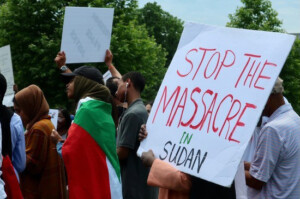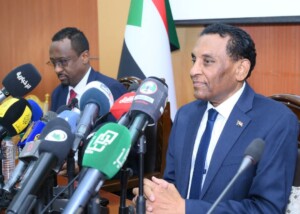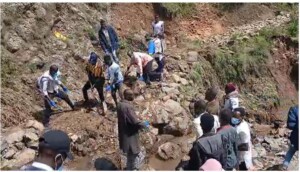Sudan floods: Severe suffering in 14 states
Torrential rains have damaged hundreds of houses in Sudan, as floods continue to inundate parts of the Nile basin. The UN Office for the Coordination of Humanitarian Affairs (OCHA) in Sudan, confirms that torrential rains have led to flooding, landslides, and damage to houses and infrastructure in at least 14 of the 18 states across the country.
 The collapse of the Bout Earth Dam, Blue Nile State, after it exceeded its full capacity on 29 July, left at least 12 neighbourhoods in Bout Town flooded, and nearly 800 houses damaged or destroyed. The incident risks compromising access to water for over 84,000 people living in its vicinity. Photo: HAC
The collapse of the Bout Earth Dam, Blue Nile State, after it exceeded its full capacity on 29 July, left at least 12 neighbourhoods in Bout Town flooded, and nearly 800 houses damaged or destroyed. The incident risks compromising access to water for over 84,000 people living in its vicinity. Photo: HAC
Torrential rains have damaged hundreds of houses in Sudan, as floods continue to inundate parts of the Nile basin. The UN Office for the Coordination of Humanitarian Affairs (OCHA) in Sudan, confirms that torrential rains have led to flooding, landslides, and damage to houses and infrastructure in at least 14 of the 18 states across the country.
Two people drowned in the Gash river in eastern Sudan’s Kassala on Tuesday. The rapid rise of the Gash also caused a limited fracture in the Saayda Bridge, however members of the public assisted to fill the fracture quickly.
In Hameshkoreib in the north of Kassala locality, a number of villages became isolated because of the floods, a listener reported to Radio Dabanga.
The floods caused a partial disruption of traffic movement on the road linking Hameshkoreib to Kassala and Red Sea state.
The source appealed to the state government and humanitarian organisations to urgently intervene to provide relief to those affected and to speed up the work of an urgent survey of the damage.
The Sudanese Red Crescent Society reported two injuries and the collapse of 250 houses totally and 137 partly in Sennar.
In Red Sea state, floods inundated valleys in the area of Marafeet in Agig locality, bordering Kassala, yesterday.
Citizens from the area told Radio Dabanga that the torrents had caused severe damage to the Marafeet market.
They pointed out that the roads connecting the area with the rest of the locality’s villages were cut off. They pointed out that the state government sent three lorries and another vehicle yesterday to rescue the most vulnerable villagers.
They called on relief organisations to intervene urgently, aid the affected people, and limit the damages.
The Red Crescent Society as well reported the flooding of seven neighbourhoods in Esteb district in Abyei in West Kordofan.
Severe damage to homes, roads, markets, and public facilities occurred as well in other West Kordofan localities.
Volunteers of the Sudanese Red Crescent have set up barricades.
They began conducting field surveys in a number of areas in West Kordofan and in El Laeit in North Darfur, to determine the extent of damage and urgent needs, and the count is still continuing.
In Khartoum, the Kanabi* Congress said in a statement that many residents of East Nile locality in Khartoum North are surviving in makeshift shelters and tents on the outskirts of the road due to the collapse of their homes due to the torrents and rains.
They demanded to provide emergency solutions, such as tents, food, and health aids, as well as a fundamental solution to the area, as many houses are built in a riverbed/valley.
OCHA
In an update on the floods issued yesterday, the UN Office for the Coordination of Humanitarian Affairs (OCHA) in Sudan, confirms that torrential rains have led to flooding, landslides, and damage to houses and infrastructure in at least 14 of the 18 states across the country.
“More than 50,000 people have been affected in West Kordofan, South Kordofan, Sennar, El Gezira, South Darfur, East Darfur, North Darfur, Red Sea, Blue Nile, White Nile, River Nile, Khartoum, Kassala and Northern states, according to the preliminary data from the Government’s Humanitarian Aid Commission (HAC). The numbers are expected to rise as the results of more assessments become available,” the OCHA report states.
OCHA says that the government, led by HAC, and aid organisations are closely monitoring the situation and providing life-saving assistance to people affected.
Read the complete OCHA update here
*Kanabi, are ‘camp workers’ that live in the agricultural schemes, often from western parts of the country, mainly Darfur. The workers settled on the outskirts of villages and near irrigation channels and water banks.
State governments consider them temporary workers; they did not provide many services. Their lives can be characterised by poverty and isolation, due to government policies and the discrimination they face based on ethnicity and culture from the surrounding population.
Radio Dabanga’s editorial independence means that we can continue to provide factual updates about political developments to Sudanese and international actors, educate people about how to avoid outbreaks of infectious diseases, and provide a window to the world for those in all corners of Sudan. Support Radio Dabanga for as little as €2.50, the equivalent of a cup of coffee.












 and then
and then